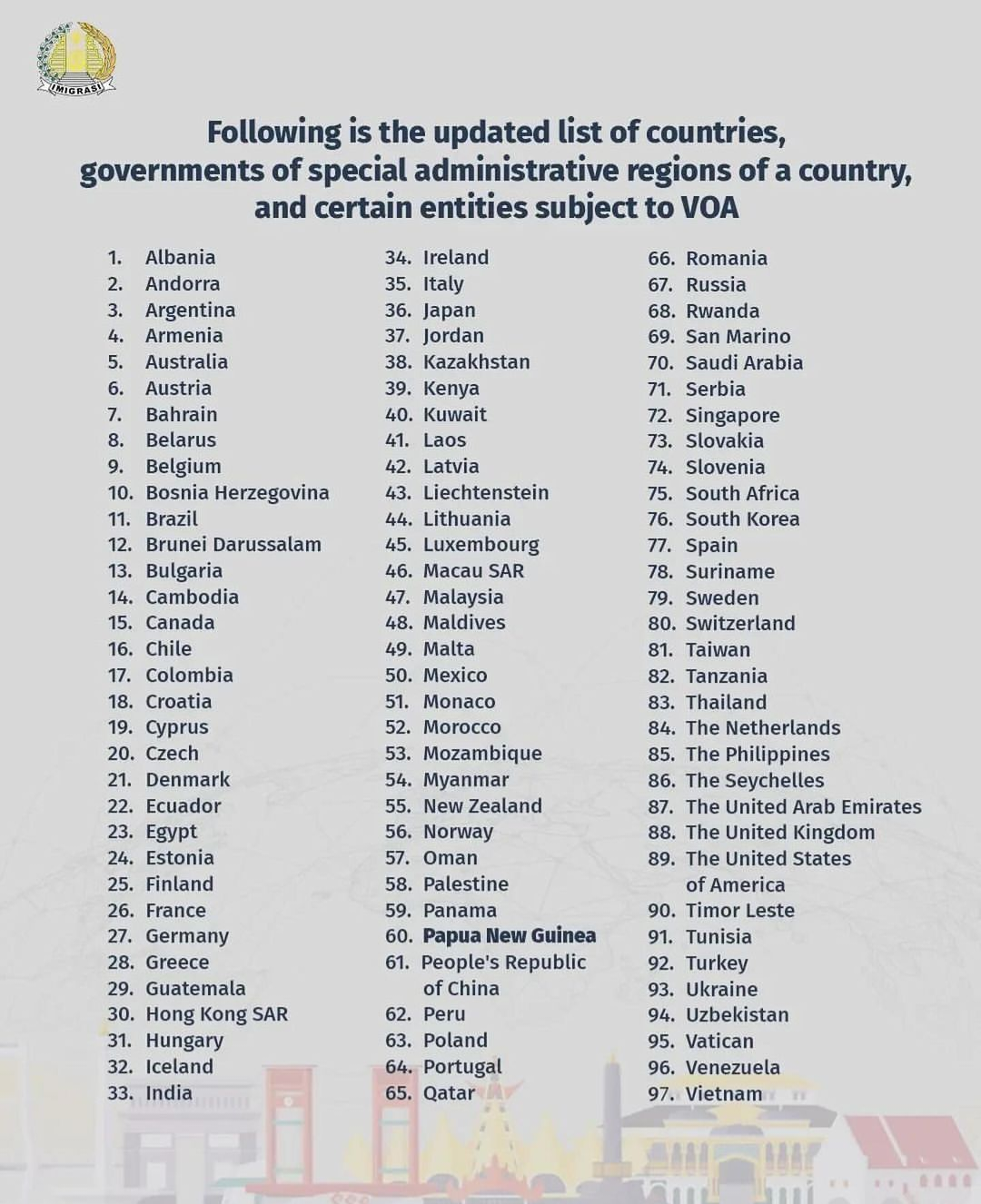For help with acquiring and renewing Indonesian visas, we
suggest Legal Indonesia agency. They provide top-notch visa services, balancing
affordability and efficiency.
📰 Stay updated on all visa and immigration-related news by following the LegalIndonesianews channel.

Useful Links
Visa on Arrival B1: VoA and eVoA
If you're planning a short stay in Bali, the
Visa on Arrival B1 (VoA or eVoA) is ideal.
This visa is currently available for citizens of 97
countries.

It is issued for 30 days and can be extended once for
another 30 days. After 60 days, you must leave the country. Overstaying your
visa in Indonesia will incur a daily fee of one million IDR for each day beyond
the expiration period.
Visa on Arrival (VoA)
A Visa on Arrival (VoA) can be obtained upon arrival at the
airport, seaport, or land border crossing. To get it, you need:
- A passport valid for at least six months
- A payment of 500,000 IDR
- A return ticket or an onward ticket out of Indonesia
You can extend the visa once for an additional 30 days, with
the extension cost starting at 500,000 IDR.
Electronic Visa on Arrival (eVoA)
You can apply for and pay for an electronic Visa on Arrival
(eVoA) to Indonesia in advance on the Immigration Service's website. This
process will expedite border control upon arrival. The entry window for the
eVoA is 90 days from the date of payment. The duration of the visa is 30 days,
and it costs 500,000 IDR. You can extend the visa online for an additional 30
days for 500,000 IDR.
Visa-Free Entry Stamp
This stamp is currently only available for citizens of ASEAN
countries.
Note that, while there is no official information regarding limitations on the maximum number of consecutive visas or entry stamps, border officials have recently been questioning travellers returning from a visa run, mainly about their employment while in Indonesia. In such cases, it's advisable to have a prepared and highly plausible explanation for their questions.
Long-Term Single Entry Electronic Visa C1
The Electronic Tourist Visa C1 is a 60-day visa available
for independent application through the Indonesian Immigration website. The
cost is 1,500,000 IDR.
Key Points:
1. Offshore Visa: The C1 visa is an offshore visa,
meaning you can only obtain it while outside of Indonesia. The entire application
process is conducted online, eliminating the need for a consulate visit.
2. Types of C1 Visa: There are two types of C1 visas
based on your visit's purpose: tourist or business. Note that working on this
visa is not permitted.
3. Single-Entry and Extensions: An electronic C1 visa
is a single-entry visa. It is issued for 60 days. It can be extended twice,
allowing for a total stay of up to 180 days.
4. Cost and Process of Extension:
- The cost of a
single extension through the Legal Indonesia agency is 2.6 million IDR.
- When using a visa
agency, submit your passport to the agent for extension at least 10 working
days before the visa expiration date.
- For the initial
extension, visit the immigration office to provide biometric data, a process
that typically takes around 30 minutes provided there are no queues.
- For each
subsequent extension, you can either hand over your passport to a courier,
personally deliver it to your visa agent’s office, or leave it there for
safekeeping and timely extension processing.
5. Departure Requirements: You must leave Indonesia
no later than 180 days after arrival, provided you have extended your visa
twice. Upon departure, the visa will be cancelled.
6. Reapplying: There are no restrictions on the
number of consecutive C1 visas you can obtain, so you can apply for the same
visa immediately after your previous one is cancelled.
7. Visa Agency Assistance: If you apply through an
agency, you will only need your passport and visa payment. The agency will
handle all other documentation on your behalf.
Important Note:
Remaining in Indonesia after the visa expiration period will
incur a daily fee of one million IDR for each day of overstaying your visa.
Plan accordingly to avoid these penalties.
Long-Term Multiple Entry Visa D
Multi-Entry visas are intended for either business or
tourism. They are issued for one, two, or five years, allowing unlimited
entries and exits from Indonesia throughout the visa's validity period. These
long-term multiple entry visas are suitable for those intending to travel
frequently to and from Indonesia, as there is no need to apply for a visa for
each entry or to extend it.
Remote Worker Visa E33G
The Remote Worker Visa (E33G) is issued for a duration of one year and is
available to employees of foreign companies with offices located outside of
Indonesia.
KITAS - Limited Stay Permit
KITAS (Kartu Izin Tinggal Terbatas) is suitable for those planning long stays in Indonesia
and offers numerous benefits, including:
- Unlimited entries and exits from Indonesia
- Medical discounts
- Local prices for tourist attractions
- Insurance
- Driver's license
- Residency-like privileges
Types of KITAS
There are various types of KITAS covering different purposes
such as:
- Work KITAS: Requires IMTA (Izin Menggunakan Tenaga Kerja Asing - foreign worker permit).
- Retirement KITAS: For individuals who have reached retirement age.
- Family KITAS: For those joining an Indonesian or a KITAS-holder spouse or parent.
- Student KITAS: For those pursuing education in Indonesia.
- Research KITAS: For those conducting research activities.
- Investor KITAS: For those investing in Indonesian businesses.
- Education KITAS: For educational purposes.
- Religious KITAS: For participating in religious activities.
Application Process
You can now apply for KITAS online. The visa cost varies
depending on the type of KITAS. When obtained through the online system,
applicants receive a VITAS (Visa Izin Tinggal Terbatas, limited stay visa) that
grants them entry to Indonesia. Upon arrival, this visa must be converted into
an ITAS (Izin Tinggal Terbatas) – a temporary stay permit issued together with
the KITAS itself, which currently resembles a document printed on an A4 sheet.
MERP (Multiple Exit Re-Entry Permit)
To enjoy the ability to exit and re-enter Indonesia multiple
times during the KITAS's validity period, holders must also obtain a special
document known as a MERP (Multiple Exit Re-Entry Permit).
Investor KITAS
This type of KITAS aims to attract affluent foreigners
interested in investing in Indonesian real estate. Although it is not a work
visa, it offers residency to foreigners and their families.
Eligibility and Family Inclusion
Applicants need to show evidence of a specified amount of
funds or demonstrate ownership of luxury property. Family members of visa
holders, including spouses, children, or parents, can also apply for this visa
type.
Application Process
To apply, submit the following documents online:
1. Valid Passport: Must have at least 36 months validity.
2. Proof of Funds: Minimum 2,000,000,000.00 IDR.
3. Recent Photograph: A 4 cm x 6 cm colour photograph
against a white background.
4. Resume: Detailing your background and qualifications.
Work KITAS
The work KITAS, accompanied by IMTA (Izin Menggunakan Tenaga
Kerja Asing - foreign worker permit), allows its holder to work in Indonesia.
Without IMTA, KITAS alone doesn't grant work rights. Holders of such permits
are limited to working within specific fields and companies. Obtaining a work
KITAS can be a lengthy process – approximately 3 months, and cost around
$2,000.
Note that working in Indonesia without a visa can lead to a
fine of up to 500 million IDR and deportation, with a ban on re-entry to
Indonesia. Those who can't pay the fine might face imprisonment for up to 5
years, followed by deportation.
Non-Employment KITAS Types
Among the types of KITAS that do not allow for employment,
the most popular ones are:
- Family Visa (Family KITAS): Granted to family members of
KITAS holders and foreigners married to Indonesian citizens. The Family KITAS
requires annual renewal and is valid for a total of 5 years.
- Student Visa (Student KITAS): Issued to students studying
in Indonesia.
- Pension Visa (Pension KITAS): Intended for individuals who
have reached retirement age, typically 55 and above.
Extensions and Expiration
Extensions are typically facilitated through a visa agency
or the employing company, with the number of extensions contingent on the type
of limited stay document issued. Upon the KITAS's expiration, it must be
formally closed.
Note: To apply for any of the visas described in this
article, you need to be outside the country.

You also need a local resident with documents and a three-month bank statement showing at least $2,000 per month in transactions.